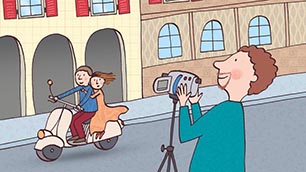I. Adverbs of Frequency: avverbi di frequenza
Adverbs expressing frequency help you to describe how often something happens or how often you do something. In English, an example of an adverb of this nature would be always. Following is a list of common avverbi di frequenza in Italian, along with example sentences. Note that usually, the adverbs follow the verb, but you can also find them in other positions.
sempreMi sveglio sempre alle 6.I always wake up at 6. quasi sempreCarlo esce di casa quasi sempre alle 7.Carlo almost always leaves home at 7. di solitoDi solito facciamo colazione alle 9.We usually have breakfast at 9. spessoPranzano spesso alle 13.30.They often have lunch at 1:30pm. tutti i giorniAndate in palestra tutti i giorni?You go to the gym everyday? a volte / qualche voltaA volte (qualche volta), fa la doccia alle 16.00.Sometimes she takes a shower at 4pm. raramenteGli italiani raramente mangiano alle 18.00.Italians rarely eat at 6pm. quasi maiNon vado quasi mai a letto alle 2.I almost never go to bed at 2am. maiNon ci alziamo mai alle 4 del mattino.We never wake up at 4 in the morning. |
II. Polite Form: Condizionale di volere
We have already seen the modal verb, volere, which means to want. In English, when we want to make a request, ask for something, or offer something to someone in a polite way, we say, I would like… or Would you like…. We can also do this in Italian. Take a look at the following chart, which shows you the conditional form of the verb volere and the appropriate translations for each example.





















